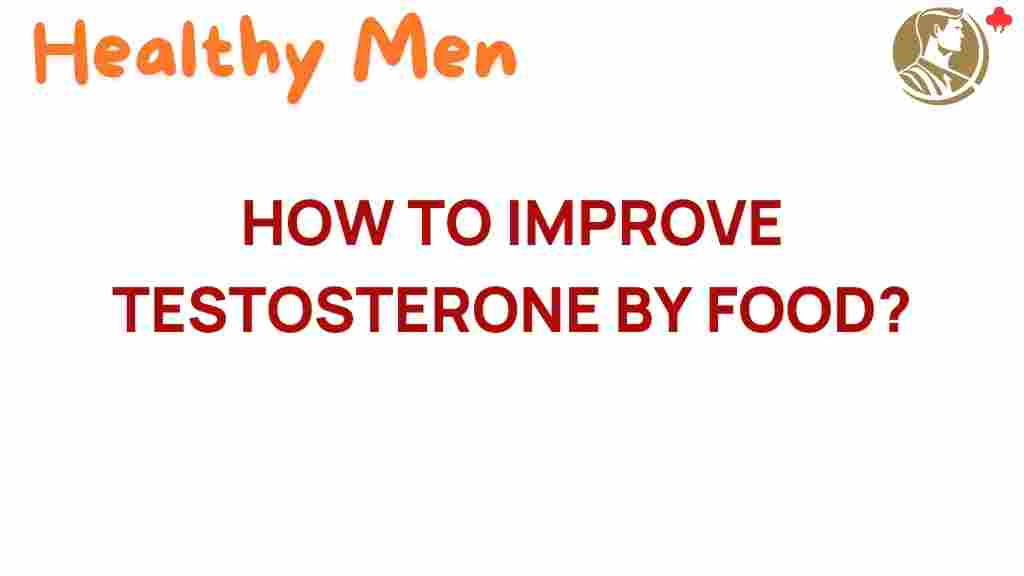Unlocking the Secrets: How Food Can Boost Your Testosterone Levels
Testosterone is more than just a hormone; it plays a crucial role in overall health, wellness, and fitness. It influences everything from muscle mass and strength to libido and mood. As men age, testosterone levels tend to decline, which can lead to various health issues. Fortunately, nutrition and diet can significantly impact your hormone balance and boost testosterone levels. In this article, we’ll delve into the best food choices, lifestyle adjustments, and nutritional strategies that can help elevate your testosterone levels naturally.
Understanding Testosterone and Its Importance
Testosterone is a steroid hormone primarily produced in the testes (in men) and ovaries (in women), with smaller amounts produced by the adrenal glands. It is critical for:
- Maintaining muscle mass and strength.
- Regulating fat distribution.
- Supporting bone density.
- Enhancing libido and sexual function.
- Influencing mood and energy levels.
Low testosterone levels can lead to fatigue, decreased motivation, difficulty concentrating, and reduced muscle mass. Therefore, understanding how to optimize testosterone through nutrition is essential for overall health and wellness.
Key Nutrients for Testosterone Production
To enhance testosterone levels, certain nutrients are particularly beneficial. Incorporating these into your diet can help you achieve hormone balance:
- Vitamin D: Often referred to as the “sunshine vitamin,” Vitamin D is vital for testosterone production. It can be obtained from sunlight exposure, fatty fish, and fortified foods.
- Zinc: This essential mineral plays a critical role in testosterone synthesis. Foods rich in zinc include oysters, beef, pumpkin seeds, and lentils.
- Omega-3 Fatty Acids: Known for their anti-inflammatory properties, Omega-3s can be found in fatty fish, walnuts, and flaxseeds, promoting overall health and hormone balance.
- Magnesium: This mineral is linked to higher testosterone levels and can be found in spinach, almonds, and black beans.
- B Vitamins: B vitamins, especially B6, are important for testosterone production and can be sourced from whole grains, eggs, and meat.
Food Choices to Boost Testosterone
Here are some of the best food choices that can help boost your testosterone levels:
1. Lean Proteins
Consuming adequate protein is essential for maintaining muscle mass and healthy hormone levels. Include sources such as:
- Chicken breast
- Turkey
- Fish (especially salmon and tuna)
- Eggs
2. Healthy Fats
Incorporating healthy fats into your diet is vital for hormone production. Opt for:
- Avocados
- Olive oil
- Coconut oil
- Fatty fish
3. Whole Grains
Whole grains provide essential nutrients and fiber that promote overall health. Consider adding:
- Quinoa
- Brown rice
- Oats
4. Fruits and Vegetables
Fruits and vegetables are rich in antioxidants and vitamins that support hormone balance. Focus on:
- Leafy greens (spinach, kale)
- Cruciferous vegetables (broccoli, cauliflower)
- Berries (blueberries, strawberries)
- Pomegranates
5. Nuts and Seeds
Nuts and seeds provide healthy fats and essential nutrients. Include:
- Walnuts
- Almonds
- Pumpkin seeds
Step-by-Step Process to Enhance Testosterone Through Nutrition
To effectively boost your testosterone levels, follow these steps:
Step 1: Assess Your Current Diet
Start by evaluating your current food choices. Are you consuming enough protein, healthy fats, and essential vitamins? Keep a food diary for a week to identify areas for improvement.
Step 2: Incorporate Testosterone-Boosting Foods
Gradually add the food choices mentioned above into your diet. Aim for a balanced plate with each meal, ensuring you include a source of lean protein, healthy fats, whole grains, and plenty of fruits and vegetables.
Step 3: Limit Processed Foods and Sugars
Processed foods and high sugar intake can negatively impact hormone levels. Reduce your consumption of sugary snacks, fast food, and processed meals. Instead, focus on whole, nutrient-dense foods.
Step 4: Stay Hydrated
Proper hydration is essential for optimal hormone function. Aim for at least 8 glasses of water per day, and consider herbal teas as healthy alternatives to sugary beverages.
Step 5: Monitor Your Progress
Keep track of how your body responds to the dietary changes. Notice improvements in energy levels, mood, and overall well-being. If you have concerns about your testosterone levels, consider consulting a healthcare professional for testing.
Lifestyle Changes for Optimal Hormone Balance
In addition to nutrition, lifestyle choices play a significant role in maintaining healthy testosterone levels:
- Regular Exercise: Engage in strength training and high-intensity interval training (HIIT) to naturally boost testosterone levels.
- Get Enough Sleep: Aim for 7-9 hours of quality sleep each night to support hormone production.
- Manage Stress: Chronic stress can lead to elevated cortisol levels, which can negatively impact testosterone. Practice stress-reduction techniques such as mindfulness and yoga.
- Avoid Excessive Alcohol: Limit alcohol consumption as excessive drinking can lower testosterone levels.
Troubleshooting Common Issues
Sometimes, despite making dietary changes, you may still experience low testosterone levels. Here are some troubleshooting tips:
1. Check for Nutrient Deficiencies
If you’re not seeing results, consider getting blood tests to check for deficiencies in Vitamin D, zinc, or magnesium. Supplementing these nutrients may help.
2. Review Your Overall Lifestyle
Are you following a consistent exercise routine? Are you managing stress effectively? Make sure all aspects of your lifestyle align with your health goals.
3. Consult a Healthcare Professional
If you continue to experience symptoms of low testosterone, consult a healthcare provider. They can provide personalized advice and treatment options.
Conclusion
Unlocking the secrets to boosting testosterone levels involves a comprehensive approach centered on nutrition, lifestyle choices, and overall wellness. By making informed food choices, incorporating essential nutrients, and adopting healthy lifestyle habits, you can enhance your testosterone levels and improve your quality of life.
Remember, achieving hormone balance is a journey that requires patience and consistency. Start by integrating the tips and food choices discussed in this article, and you’ll be well on your way to a healthier, more vibrant life.
For more information on hormone health, check out this resource. And for personalized nutrition advice, consider consulting a nutritionist or healthcare provider.
This article is in the category Nutrition and created by healthymen Team
